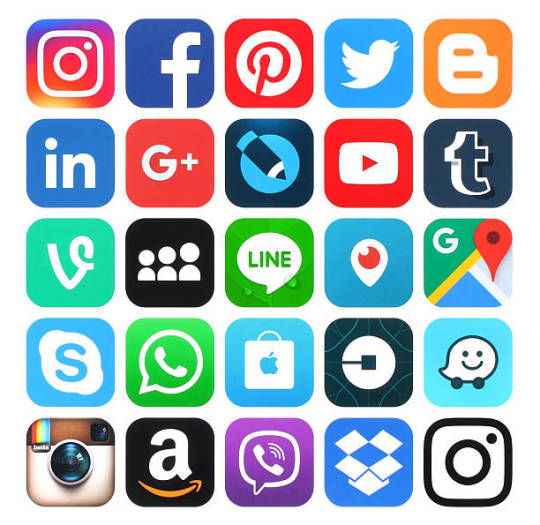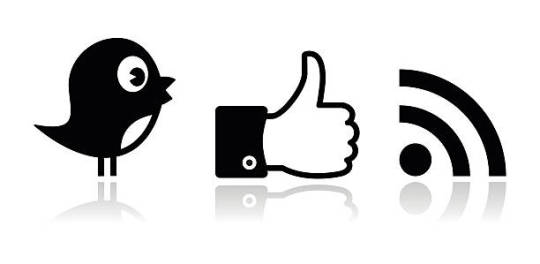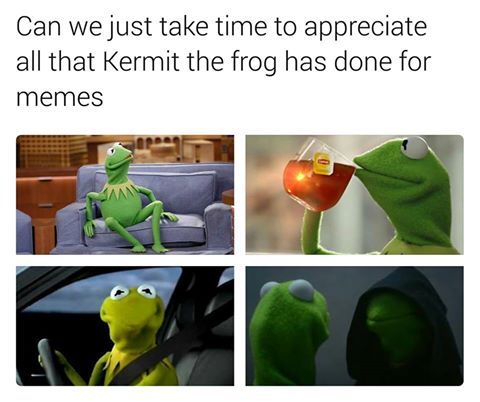Don't wanna be here? Send us removal request.
Text
So many Flavors of Opinions

When we dive deeper into the psychological profile of social media and the power it holds over us, we can find that the feeling of connection is an all too common occurrence. We like speaking with like-minded individuals who share common interests. After all, who really likes arguing online about opposing positions? Some reasons we find ourselves stuck on social media networks include knowing that everyone else is doing it too. I personally like knowing I can talk to my mom on Facebook Messenger than just the traditional phone call, and I feel connected more with her because none of our parents ever wanted to get into technology, and look at them now!
Website Algorithms


It’s common knowledge that every website has a system in which it tracks its users and their usage, allowing users to see content that is relevant to them. According to McGauran (n.d.), social media provides a substitute to real life friends and family and allows for an emotional distance with the premise of intimacy. A study found that the more time someone spent on Facebook the more depressed and lonely they became over time according to Arbor, (2013) of the University of Michigan.

Troubles of Online Interaction

The thrill of online interactions is quite often short-lived by the constant bombardment of bullying, violence or acts of terrorism occurring worldwide. Every time you share something, whether it’s a photo, a quote or someone else’s post, you run the risk of there being an opposing side. This is polarization, quite the opposite of the attention that was initially looked for. One such example takes us back to the early years after the first World War in the country of Germany. The political parties consisted of the extreme left (the Spartacists) and the extreme right (the Nazi party) and was around the time of The Great Depression. The people were out of food and left without jobs which made them turn to fascism and communism (Sensagent, n.d.). You know the rest.
www.WhatTheWorldNeeds.com

Fortunately, there’s plenty of ways to not deal with such negativity nowadays.
1.) Don’t post what you’re afraid to be shared.
(That’s how people judge and develop opinions of each other without knowing them)
2.) Share only with people you know.
(Kind of obvious.)
3.) Don’t take it to heart.
(The internet is full of trolls. Their very existence is to make others feel the way they do. Polarization of trolls!)
The society online is much like the society in real life. Social media was designed on a platform of maintaining online relationships with your peers and family. Over the years it has drastically changed into the platform(s) we use today. Although, cyberbullying, violence and acts of terrorism are still a very real threat on social media networks, the internet has become it’s own nation of “yes” and “no’s”. Polarization of opinion has taken over the internet. Best thing to do? Don’t worry about it. There’s nothing wrong with browsing and always being curious as to the opinions of others, in fact that’s healthy. Be curious! It’s what helps us learn. Keep an open mind as to what you might learn online, find another source with the same information to confirm, and remember, this is WORLD WIDE, not just YOUR world. People in different parts of the globe do and say things differently. See things in their perspective, we can learn so much more about each other, we just worry about who likes us to do anything about it.
References
Arbor, A.,(2013) Facebook use predicts decline in happiness, new study finds. Michigan News. Retrieved from: https://news.umich.edu/facebook-use-predicts-declines-in-happiness-new-study-finds/
Sensagent, (n.d.) Polarization in other national politics. Sensagent. Retrieved from: http://dictionary.sensagent.com/polarization%20(politics)/en-en/
0 notes
Text

_The irony in this? You’re on Tumblr. _
Ice Cream
**Uce Cream **
We’re all pretty familiar with the term “like for like” or “follow for follow” right? It
exists on almost every website you visit. Even in Youtube videos, publishers are
making sure to include that statement in their recordings. It’s a pretty important
sentence, it’s the only way to spread the word about you or your brand. For big
name companies, it’s pretty easy as they’re already well known to everyone,
things like “Like our page on Facebook for weekly coupons!” will get just about
any savvy shopping consumer to hit that thumbs up! For the most part, we all
know that, the social media marketplace was created by big companies to profit
from the internet. And what a glorious decision that was! Schwans grocery store
home delivery!? I never have to leave home again! (seriously!) We’re also
aware that social media network is just an easier way for us to communicate to
each other about Schwans grocery store home delivery! insert sarcasm _

I ordered the chicken. Staying for dinner?
So why exactly do we constantly find ourselves getting lost on Youtube at night,
posting that sad picture of our salads, or a status update thinking like our
friends could relate to it? A little word called Homophily. (It’s kinda’ little, I
think?) It’s derived from the ancient Greek word Homou, “together” and it’s
known as wanting to seek out people who act and think like ourselves. Pretty
much narcissism, just a fancier word.
_Feeling the Need _
So, by now you’re probably wondering, “well, what does your fancy word have
to do with me? I like surfin’ the web to pass the time in the john, you know the
deeaal! “Well that’s my point, so does everyone else. See, there’s plenty of
people like us, and it’s that very reason we tend to keep our inner circles close.
We feel as though we may not find others, yet we keep trying. Once we
establish a connection in real life, we find ourselves wanting an online
connection as well, so as to not lose touch, you know? because someone will
definitely act like they don’t know you after going home and then seeing them
the next day. (there’s that sarcasm again) According to Seiter, (n.d.) the feeling
of wanting likes on social media, taps into our primal urges of wanting attention,
creating addictions and what brings us joy. Social connection becomes
desirable because let’s face it, NO. ONE. WANTS. TO. FEEL. ALONE. Being
alone makes us do and say things that don’t end up benefiting us in a positive
way at all. Feeling lonely however, makes us re-evaluate the way we look at
ourselves, we wonder why we’re alone and why no one approaches us
(Zhivotovskaya, Alloro, n.d.). Maybe it’s our appearance, maybe it’s our
interests, or, maybe our hygiene but you’re too embarrassed to tell anyone
about it so you hope no one notices you smell funnier and funnier every day!
Social media allows us to develop a digital persona where no one can see the
real us unless we really want them to. It’s those feelings of insecurity that gives
us the need for attention, and who can blame someone who has never had it?
Once you get offered a snack you want the whole kitchen!

_One in the same. _
_I like it, Do you?_

One like can go a very long way in social media. The algorithms of websites like
Facebook, Instagram or Twitter, are specifically designed to constantly monitor
the search and “Like”, “Follow” or “Tweet” of its users. This is how the always
refreshing “feed” of the sites is showing something related to your previous
online history. The concept is, “hey you like this, so does this person. oh wait!
This person does too! Check out how many likes or shares this person got for
liking the same thing! Actually, everybody likes it!” More and more of the same
will pop up on your feed. This phenomenon is known to expand on social
media. It’s the only place where things expand instantly! The more people like
memes of Kermit, the more he becomes a more prominent presence when
logging in. Bisgin, Halil & Agarwal, Nitin & Xu, Xiaowei in (2012) wrote in their
article “A study of Hemophily on Social Media”, that it, [social media] which is
more than just the space for interactions, surpassed all the requirements
needed in terms of growth for reasons unknown. You meet new people online
the same way you meet them in real life. Rad! _

They’re Watching You..Yes..THEY. _
Today, everybody that’s anybody knows now that anything you search
especially on Google , will somehow appear on Facebook as an ad. I mean
really! I was freaking out when I saw the Purple Mattress ad on my Facebook
feed. Like, this isn’t some regular thing on Facebook, why is it appearing now?
OH! It’s because of the Algorithms. Videos, pictures and quotes appear more
based on how relevant they are. If you’re an avid social media user like me,
you’ll recall that Facebook used to just show content from the brands,
companies and big names you liked with the occasional high school friend
posting about their 5th child. Well at a conference in 2018, Facebook founder
Mark Zuckerberg, announced that the algorithms for the site will be set to
prioritize more family and friends (Tien, 2018). The point of online interactions
is to stay connected with family in new ways right? WRONG! What about social
media marketing? (That’s actually a job!) The fact that people hit thumbs up on
the same things makes for an impressive use of resources when it comes to
business. I mean, if I was Target and I noticed that people are liking a lot of
pictures of a puppet of Kermit the frog sippin’ tea in different positions, I would
show them where to buy that exact puppet to make their own hilarious photos..
To share and have people like and go viral and continue the cycle!
_References _
Bisgin, Halil & Agarwal, Nitin & Xu, Xiaowei. (2012). A study of homophily on social media. WorldWideWeb. Retrieved from: https://www.researchgate.net/publication/220301971_A_study_of_homophily_on_social_media
Seiter, C.,(n.d.) The Psychology of Social Media: Why we Like, Comment and Share Online. Buffer. Retrieved from: https://buffer.com/resources/psychology-of-social-media
Tien, S.,(2018) How the Facebook Algorithm Works and How to Make it Work for You. Hootsuite. Retrieved from: https://blog.hootsuite.com/facebook-algorithm/
_Zhivotovskaya, Alloro,(n.d.) Why Social Connection is So Important. The Flourishing Center. Retrieved from: https://theflourishingcenter.com/why-social-connection-is-so-important/ _
1 note
·
View note
Text
Don’t Click here or you’ll have Bad Luck!

“Red oh-la-la light” by P C . https://www.pexels.com/photo/red-oh-la-la-light-1735658/
So you ended up clicking that link and it took you here huh? Typical, most click bait site headers are like that. What makes them so enticing? Why do we even bother with something that may end up being a waste of time anyway? Let me explain!
Capturing Attention in Social Media
It’s all click bait! admit it! no but seriously, whether what you are presenting is relevant to this time or not, as long as the title catches a reader’s attention, a super long intellectual title doesn’t always do the job. Let’s face it, not everyone really wants to read up on an article titled: “Statistically speaking, everyone has a partner they’re not happy with, so why be with them?” Better yet, “Alice Deejay thinks you’re better off alone” These titles are important because it is what will get readers in the long run. People will understand your point of view better if you word everything in an easy tone. We have to keep in mind as well that the majority of our populace access their social media on their mobile device, therefore, any material we present has to be mobile friendly.
Although, every post doesn’t go on without its fair share of difficulties and challenges. Some good ways to stay on top of keeping readers on their toes, is the language used. If I type out everything the way I actually speak, then readers would be able to relate to my opinions more. This doesn’t always apply but this is something that I personally look for. I rather read into the publisher’s thoughts rather than feeling like I’m reading a manual online. According to Mendenhall(2016), the material we try to present has to be continuously presented in ways where the consumer will end up remembering that they already came across our article in order for it to stick in their minds.
Maintaining Engagement in Social Media
How do we keep our readers locked in on the article? Simple! Keep things fresh and up to date! Keep the language simple and relative to today’s language. Now I don’t mean trying to incorporate words like lit, no cap, or LOL, every now and then. Well, maybe an LOL here and there! Something to remind someone they’re not just reading some boring old article. This is important because you want people to retain the information you’re presenting. One important strategy in maintaining engagement is accessibility. Most people access their sites using their mobile device. You can find and do almost anything over your smart phone. For big name brand companies like Amazon, the internet is their livelihood. Putting ads out on random Youtube videos or even personal posts that have gone viral is essential in promoting a brand. Every company does that nowadays, so there is hardly a lack of engagement now, but it’s a very useful strategy. Social media doesn’t just involve blog posts, but it mainly is about ones postings. On Facebook, it’s about ones personal life in postings they make. What keeps you looking at them? Well, I’m a curious person, therefore Curiosity drives me to keep on scrolling. On Twitter, its practically all Humor/Entertainment. People posting hilarious messages or creating comedy type videos is a method of keeping someone engaged. Information is likely the biggest reason people have come to enjoy the internet and the social media it has helped create. Anything one wishes to look up, even the most random of questions can be found on the internet or even social media.
0 notes
